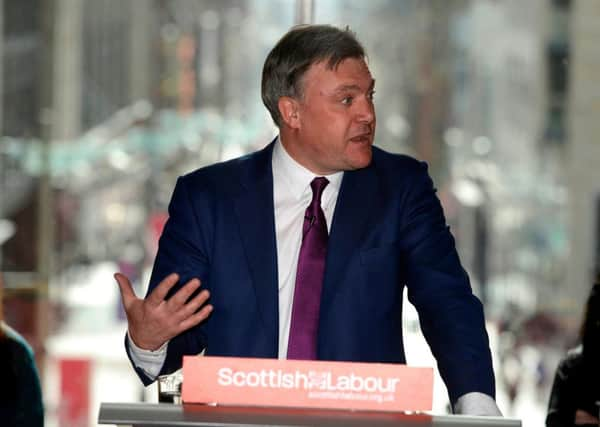A vote for SNP is vote for Tory austerity - Balls


Ed Balls, who joined the party’s Scottish leader, Jim Murphy, in Glasgow, said a vote for the SNP was “a vote to continue Tory austerity” because it increased the chances of David Cameron being returned as prime minister.
He said the SNP’s own plan for full fiscal autonomy for Scotland would bring an end to the “pooling and sharing of resources” across the UK and lead to substantial cuts to frontline services.
Advertisement
Hide AdAdvertisement
Hide Ad“Every vote in this election that might allow the Tories back in is a vote for continuing austerity in Scotland,” Mr Balls said.


“The only way to end Tory austerity in Scotland is to vote Labour.”
Mr Balls used his speech in Glasgow to launch a fightback against the SNP, which opinion polls suggest is poised to take a swathe of seats from Labour and could end up holding the balance of power in a hung parliament after next month’s general election.
Last night Scotland’s deputy first minister, John Swinney, insisted that full fiscal autonomy would allow Scotland to deliver a stronger economic performance and tackle inequality across the country.
At a debate at Holyrood yesterday, Mr Swinney told MSPs: “We have to do something differently. To those who say we cannot possibly, in exercising distinctive responsibility, create a better level of economic performance, I just dispute that dismal assessment that is put forward.
“What fiscal autonomy enables us to do is take a different course of action.”
The SNP is expected to heavily push for “devo-max”, with tax and welfare powers devolved, but defence and foreign affairs reserved to Westminster, in parliament after the general election.
Mr Swinney said the SNP’s plans would see Scotland remain within the “fiscal and economic” framework, with an arrangement that would see the Bank of England retain responsibility for setting interest rates.
Advertisement
Hide AdAdvertisement
Hide AdIn Glasgow, Mr Balls sought to paint a bleak picture of the consequences of the SNP’s plan for full fiscal autonomy for Holyrood, which he said would mean “continued austerity” due to the end of the Barnett Formula, which is used to distribute cash across the UK.
Mr Balls warned that if Holyrood was forced to raise all its own finance for public services it would face a major funding gap that could mean cuts of up to 12 per cent from Scotland’s existing budget in areas including the NHS, schools, pensions and welfare.
He said: “The biggest lie in the election is that the SNP is an anti-austerity party.
“They remain wedded to a fiscal approach for Scotland which rejects the pooling and sharing of resources across the United Kingdom.
“That doesn’t just mean scrapping the Barnett Formula – damaging though that would be.
“Fiscal autonomy makes it impossible for Scotland to end Tory austerity. The SNP’s proposals would cost Scotland billions.”
The stark warning from Mr Balls represents one of the most scathing attacks yet by Labour on the consequence of the SNP’s demand for the devolution of all tax and welfare powers.
Mr Balls said that there were several reasons why an SNP vote on 7 May would lead to more cuts in Scotland, including what he claimed was the Nationalists’ opposition to key social justice measures.
Advertisement
Hide AdAdvertisement
Hide AdHe said a vote for the SNP would allow the Conservatives to remain in power and preside over £7.6 billion of cuts.
He said: “You can’t trust the SNP on social justice. Whether it’s voting against the living wage, their cuts to college places or their plan to scrap the block grant, the central mission of the SNP has never been making this country a fairer place to live. That has been the historic mission of the Labour Party.
“In fact, according to the independent Institute for Fiscal Studies, the SNP’s plans for Scotland would mean £7.6bn of spending cuts and tax rises.
“This would have a hugely damaging impact on living standards and public services in Scotland.
“The extra austerity that would be required if Alex Salmond and Nicola Sturgeon get their way and fiscal autonomy is imposed on Scotland would swamp any benefit from an increase in spending.
“Quite simply Nicola Sturgeon’s numbers don’t add up – and if they got their way the SNP plans would mean more, not less austerity.
A 12 per cent cut in all Scottish spending, including pensions and benefits.”
Mr Balls went on to claim that Treasury plans, highlighted by Gordon Brown earlier this week, showed the Nationalists were signed up to zero spending for 2015-16.
Advertisement
Hide AdAdvertisement
Hide AdHe said: “Until they were dragged there kicking and screaming this weekend – they even opposed our plan to reverse the Tories’ tax cut for millionaires.
“Working people in Scotland should judge the SNP by their record, not their rhetoric. It’s the next Labour government who will introduce early legislation to ban zero-hours contracts for employees who are in practice working regular hours.”
Last night Jim McColl, the founder of Clyde Blowers Capital and one of Scotland’s most successful businessmen, called for Holyrood to have full control over its finances by 2020.
Mr McColl, a high-profile supporter of the Yes campaign in last year’s independence referendum and a member of the Scottish Government’s Council of Economic Advisers, said full fiscal autonomy would give Scotland “meaningful powers” to grow the economy and close the public spending gap.
He said the issue of independence has now been “settled” and he saw no need for another referendum. “If you want to avoid something like that happening again, you really have to be a bit more open about what you’re going to devolve,” he said.
Mr McColl said full fiscal autonomy could be phased in over the term of the next parliament.
“It takes time to do the transition and you would have to have some sort of transition between the Barnett Formula dropping off and the new way of working coming in.”
FOLLOW US
SCOTSMAN TABLET AND MOBILE APPS